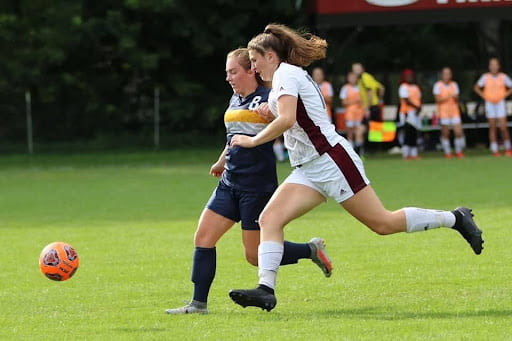By Page Brown, Contributing Writer

UMF Senior Mckenna Brodeur chases down a ball during a soccer game against the University of Southern Maine.
University of Maine at Farmington student-athletes have returned to the field this year after a full season of Covid-related adjustments. A lack of competition and team interactions coupled with regular testing and mask-wearing took a toll on the mental health of many athletes, who traditionally pride themselves on strength and perseverance. Pushing through a tough practice or game is championed by advertisers, coaches, parents, and society as a whole. Yet, in the post-pandemic world- this narrative has shifted as student-athletes dismantle the warrior mentality and open up about mental health struggles.
The pandemic placed athletes in a vulnerable state, removed from their traditional routine. Researchers at the National Collegiate Athletic Association found that the rates of reported mental health concerns in the fall of 2020 were 1.5 to two times higher than in previous studies.
The increase in reported struggles comes as no surprise to UMF Interim Athletic Director Jamie Beaudoin. “For fifteen years they have had this routine, and COVID has interrupted their routine,” Beaudoin said. “And even though we were able to find ways for teams to practice and compete, it wasn’t what it used to be. This added to student-athletes anxiety as it isn’t what they are used to.”
UMF men’s soccer head coach Blake Hart said he’s seen noticeable shifts in team wellbeing, with players appearing unwilling to practice, nerves surrounding COVID, and poor team chemistry. “As a coach, it was hard to try and lead a team, but more so to watch players not enjoying a pivotal piece in their everyday life,” Hart said.
These struggles were also noticed by women’s soccer player McKenna Brodeur and men’s golf team member Christopher Frey, both pointing towards the lack of team interaction and loss of athletics creating sentiments of anxiety and isolation. Both athletes believe there has been an influx of mental health concerns, and that raising awareness of it and being a supportive outlet for their teammates both mentally and physically is now prioritized. “We all know how fortunate we are to play and we’re enjoying each day together,” Brodeur said.
These comments point to a shift in athletics, with coaches and players alike recognizing the importance of keeping healthy both mentally and physically in order to perform at their full potential. The change in dialogue has been encouraged at UMF. During DIII week last April, UMF athletes attended yoga classes and informational workshops about the importance of resilience and stress management. Guest speakers such as Victoria Garrick, founder of The Hidden Opponent, visited UMF last spring and spoke against the perceived weakness around mental health. Garrick discussed how the lack of visibility paints a misleading portrait on the mental well-being of athletes, an aspect she reiterated in an interview with the New York Times. “I remember Googling and not being able to find anyone or athletes who made me feel less alone.”
Her organization creates the place she was searching for through advocacy programs that argue that being mentally tough is no longer hiding behind a facade of strength, rather it lies in checking in on teammates, speaking up when one is struggling, and advocating for others to do the same. Mental health resources are becoming more readily available and accessible for athletes, granting students a space to grapple with the widespread mental health crisis.
Yet, this is just the beginning of this cultural shift, with Beaudoin using a metaphor to describe the crossing point athletics is at, stating “COVID showed us a bit more of the iceberg. As a coach, I see the tip of the iceberg, but COVID lowered the water and made it so mental health is much more open and out in front of others.” Continuing to hold these conversations and creating spaces for athletes to discuss their mental health changes the paradigm from mental weakness back to strength.
